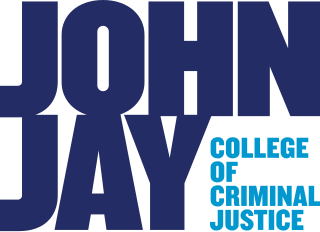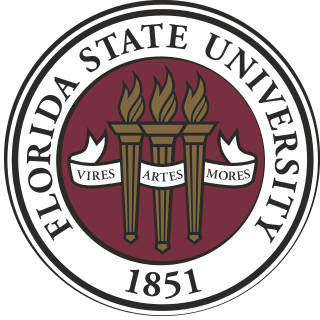
The John Jay College of Criminal Justice is a public college focused on criminal justice and located in New York City. It is a senior college of the City University of New York (CUNY). John Jay was founded as the only liberal arts college with a criminal justice and forensic focus in the United States.

Florida State University is a public research university in Tallahassee, Florida, United States. It is a senior member of the State University System of Florida. Chartered in 1851, it is located on Florida's oldest continuous site of higher education.
The Watts College of Public Service & Community Solutions is one of the 24 independent school units of Arizona State University. It is located at ASU's Downtown Phoenix Campus in Arizona. Founded in 1979, the college awards bachelors, masters, and doctoral degrees and is organized into four schools and 17 research centers. The programs are divided amongst the School of Social Work, the School of Criminology and Criminal Justice, the School of Public Affairs and the School of Community Resources and Development.
The Florida State University College of Education, Health, and Human Sciences is one of sixteen colleges comprising the Florida State University (FSU). The College has roots that reach back to the West Florida Seminary and the State Normal College for Teachers. The College has a number of nationally ranked programs and is in the Top 20 nationally in terms of doctoral degrees awarded.
The Florida State University School of Information is a school within the Florida State University College of Communication and Information.

The Florida State University College of Social Work, is the social work college of the Florida State University. The College is the oldest in the state of Florida and was the first in the world to offer a Master of Social Work through an accredited online program. More than 1,100 students are enrolled, including undergraduates and graduate students, including Master of Social Work and Doctor of Philosophy students. The BSW and MSW programs are accredited by the Council on Social Work Education.
The Florida State University College of Social Sciences and Public Policy, located in Tallahassee, Florida, is one of fifteen colleges comprising Florida State University (FSU). The college was founded in 1973 and includes six departments: Economics, Geography, Political Science, Sociology, Urban and Regional Planning and the Askew School of Public Administration and Policy and interdisciplinary programs in African American Studies, Demography, International Studies, Interdisciplinary Social Science, and Public Health.

The Florida State University College of Fine Arts, located in Tallahassee, Florida, is one of sixteen colleges comprising the Florida State University (FSU).
Florida State University Panama City is located 100 miles (160 km) from the Tallahassee campus in Panama City, Florida. Established in 1982, the campus serves more than 4,000 students supported by 20 bachelor's and 9 graduate degree programs on campus and online.
The Andrew Young School of Policy Studies (AYSPS) is a school of public policy and one of 12 schools and colleges that constitute Georgia State University. Founded in 1996 as the Georgia State University Policy School, the school was named after civil rights leader Andrew Young in 1999.
The Askew School of Public Administration and Policy, located in Tallahassee, Florida, is a graduate school within the Florida State University College of Social Sciences. The School was founded in 1947 and offers eight specializations within the MPA, as well as joint degree programs with Urban and Regional Planning, Social Work, Criminology and Criminal Justice, and the Florida State University College of Law. It was renamed in honor of the former governor, Reubin Askew.
Freda Adler is a criminologist and educator, currently serving as professor emeritus at Rutgers University and a visiting professor at the University of Pennsylvania. She was President of the American Society of Criminology in 1994-1995. She has acted as a consultant to the United Nations on criminal justice matters since 1975, holding various roles within United Nations organizations. A prolific writer, Adler has published in a variety of criminological areas, including female criminality, international issues in crime, piracy, drug abuse, and social control theories.

The College of Social and Behavioral Sciences (SBS) at the University of Massachusetts Amherst is home to the School of Public Policy as well as nine academic departments offering 13 undergraduate majors, 11 areas of Master's and doctoral study, and a number of graduate certificate programs. The college bridges science and liberal arts, encouraging students to pursue cross-disciplinary studies, take classes outside their chosen major, and participate in research projects with faculty mentors.
Randy Borum is a professor and coordinator of strategy and intelligence studies in the school of information at the University of South Florida and has taught at USF since 1999. He is author/coauthor of approximately 160 professional publications, has worked with three Directors of National Intelligence (DNI) on the Intelligence Science Board (ISB), served on the Defense Science Board Task Force on Understanding Human Dynamics, and is an instructor with the Bureau of Justice Assistance (BJA) State and Local Anti-Terrorism Training (SLATT) Programs for Investigations and Intelligence.
The Academy of Criminal Justice Sciences (ACJS) is an international association established in 1963 to foster professional and scholarly activities in the field of criminal justice and criminology. ACJS promotes criminal justice and criminology education, policy analysis, and research for scholars, practitioners, and policymakers. Its national office is located in Greenbelt, Maryland, a suburb of Washington, D.C., in the US.
Thomas G. Blomberg is an American criminologist. He is an expert in criminology research and public policy; delinquency, education and crime desistance; penology and social control; and victim services. He is currently the Dean, Sheldon L. Messinger Professor of Criminology, and the executive director of the Center for Criminology and Public Policy Research at the Florida State University College of Criminology and Criminal Justice.
Daniel Preston Mears is an American criminologist, a Fellow of the American Society of Criminology, and the Mark C. Stafford Professor of Criminology at the Florida State University College of Criminology & Criminal Justice. A 2011 ranking of American criminologists ranked Mears as the second most influential in terms of scholarly contributions. His research interests include the study of supermax prisons, immigration and crime, causes of offending, sentencing, and juvenile and criminal justice policy.
Charles Franklin Wellford is an American criminologist, emeritus professor in the Department of Criminology and Criminal Justice at the University of Maryland–College Park. He previously served as the department's chair. In 1996, the Department of Criminology and Criminal Justice established the Charles Wellford Fellowship in his honor. He was chair of the University of Maryland's Athletic Council from 1995 to 2008. He was the president of the American Society of Criminology (ASC) during 1995–96. In addition he was the research director for the National Issues Center at Westinghouse Corporation, director of the Federal Justice Research Program, Director of the Maryland Justice Analysis Center, Director of the Center for Applied Studies, Director of the Office of Academic Computing, Dean of Graduate Studies and Research and Dean of Continuing and Extended Education. He twice served as the President of the Atlantic Coast Conference and served on the Championship Cabinet and Management Council of the NCAA.

Karuppannan Jaishankar is an Indian criminologist. He is the Founder and Principal Director and Professor of Criminology and Justice Sciences at the International Institute of Justice & Police Sciences, a non-profit academic institution and independent policy think tank in Bengaluru, Karnataka, India and an Adjunct Faculty Member of the United Nations Interregional Crime and Justice Research Institute, Italy & University of Peace, Italy, and he teaches modules of the Master of Laws (LL.M.) in Cybercrime, Cybersecurity and International Law.
Preeti Chauhan is a Professor of Psychology at John Jay College of Criminal Justice and the Graduate Center at the City University of New York (CUNY). Her research mostly focuses on juvenile and criminal justice systems, with a particular emphasis on pretrial detention and lower-level enforcement, such as misdemeanors. Chauhan also co-founded the Data Collaborative for Justice at John Jay College, where her research has impacted policy changes throughout New York and other states.





